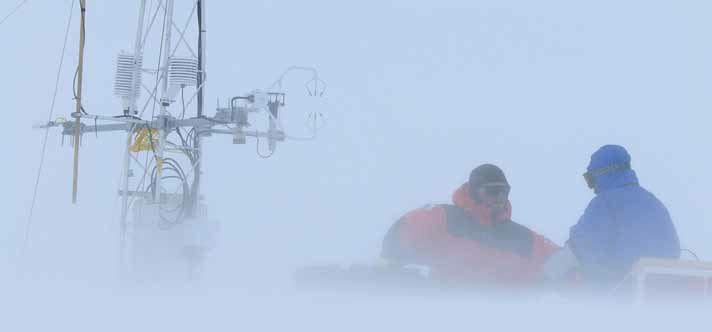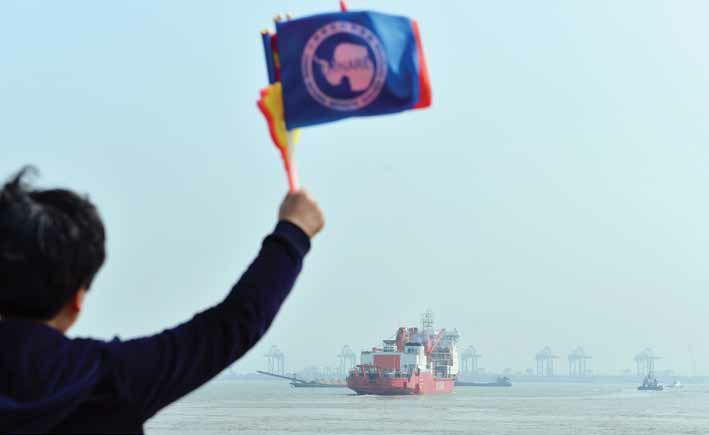Northern chill
2013-02-05
Chinese icebreaking vessel “Snow Dragon” was not alone as it motored toward the North Pole last August. The Norwegian coast guard tailed the ship during part of its voyage back to China through the Arctic Ocean, according to an officials blog that documented the journey. Although the quick reference at the end of the entry may seem benign, it highlighted the nearly two years of tension between China and Norway that could come to a head in the globes northernmost region.
Norway provoked Chinese government ire in late 2010, when dissident Liu Xiaobo was named Nobel Peace Prize laureate while sitting in a prison cell in northern China. The Norwegian parliament appoints the committee for the award, one of the worlds most widely recognized. The relationship –one that brought the countries midway through talks on a free trade agreement– has ended in a standoff in which China largely calls the shots.
But despite chilled relations with Norway, resource-hungry China has been increasingly active in Scandinavia and the Arctic. Chinese leaders toured several Arctic states last summer, and the country is putting down roots for future investment in what has been called one of the worlds last untapped strongholds of oil and minerals.
Although Norway has taken a largely passive stance against China, it may get its chance to strike back. China is angling to gain observer status on the Arctic Council, a committee of eight Arctic states that formulates policy for the region. Norway may move to block that bid at the committees meeting in May, shutting China out of the talks that will increasingly regulate how external powers operate there.

“Working the ground”
Nuuk, the capital of Greenland, is an unlikely gathering point for politicians from the worlds major powers. Recently, however, in the city of about 16,000 people, the chances of bumping into an industry minister from China or a finance official from the EU has jumped considerably. “Its starting to be a meeting place for American, European and Asian interests in the Arctic,” said Damien Degeorges, a researcher at the University of Greenland.
Chinas Minister of Land and Resources Xu Shaoshi passed through Nuuk early last year ahead of President Hu Jintaos visit to Denmark in June, and Greenland Premier Kuupik Kleist met US Secretary of State Hillary Clinton in May. Greenlands politicians have noted somewhat humorously that the showering of attention on the largely unpopulated piece of land is purely commercial.
The Arctic may hold up to 30% of the worlds undiscovered oil and an abundance of minerals such as uranium, gold and zinc, the 2008 US Geological Survey showed. Those resources will become increasingly accessible as global warming causes the ice that has long guarded them to melt at an unprecedented rate. The ice that covers the majority of the Arctic Sea has shrunk by half during the past 30 years, satellite images revealed last summer.
As the melt increases access to the Arctic, transport on the icy waters has become as enticing as the physical spoils. The so-called “northeast sea route” is expected to be ice-free by 2030. The passage along Russias 17,500 kilometer northern coast will shave 10 days off the now three-week trip between Asia and Europe – a shortcut worth a fortune to shipping companies.
“Another great power in the region”
To date, Chinas resource-hungry government has been vocal only in its intentions to conduct research on subjects such as the effects of global warming in the Arctic. Beijing has proclaimed that the country has no formal policy for the region roughly defined as all that lies north of the 66th parallel.
This hasnt fooled leaders in the North Atlantic. Chinas interest in resources and waterways has grabbed the attention of Scandinavian politicians, to mixed effect. Denmark and Iceland have warmed somewhat to Chinese investors, especially after the financial crisis rocked Europe in 2009. Greenland, a self-governing territory of Denmark, may very well be ground zero for incoming investment in the region.
“For Greenland and Denmark, the Arctic is a good card to play with China. If China is interested then they can strengthen their relationship,” Degeorges said.
Since defaulting at the onset of the financial crisis in 2008, Iceland has shown a keen interest in Chinese investment, although the countrys parliament hotly debates the risks and benefits of a strong Chinese presence. Chinese billionaire Huang Nubo received a mixed welcome when he proposed to buy 300 square kilometers of the island nation to build a resort. After multiple applica- tions, the government showed little sign of approving Huangs purchase, and he has since given up on investing in Iceland.
Trepidation over Chinas influence in the region can be felt throughout Scandinavia. “Many states are quite reluctant to welcome Chinas interest in the Arctic because it might threaten their own sovereignty and resource claims,” said Robert Murray, a professor of political science at the University of Alberta in Canada, and an expert on Arctic affairs.“Denmark is interested in the potential for access to Chinese markets, while Norway, Finland and Sweden tend to see another great power in the region as a security threat.”
The existing “great power” in the region is Russia, which has long stirred territorial tensions with its Scandinavian neighbors. Its unclear how Russia will respond to Chinese activity, given its recent claims to large chucks of the North Pole and the resources therein.
Russia was certainly paying attention when “Snow Dragon” passed through the northeast sea route last summer. Murray said Chinese and European cooperation might even serve as a counterbalance to Russias aggressive strategies, which have included erecting Russian flags on coastal ridges deep beneath the sea.
“Badly behaved” Norway
Despite its growing interest in the region, China has still been harsh in its treatment of Norway, and the standoff shows little sign of ending. Early last month, Norway was excluded from a list of 45 countries whose citizens were allowed visa-free transfers through Beijing and Shanghai starting January 1. When asked why Norway was one of the few European states to be left off the list, a Beijing official said some “poor quality” and “badly behaved”countries would still need visas, though he didnt name Norway specifically.
Strained relations first became palpable in early 2011 in Norways seafood trade with China. The countrys fresh salmon exports to China in 2012 were comparable to those in 2010, despite annual growth of up to 40% in the Chinese market for the fish, said Sigmund Bjorgo, a representative for the Norwegian Seafood Council in China. “China is a booming market for salmon. The market has grown by 70% since 2010 and Norway has not been a part of that growth,” he said.
In early 2011, China slapped new regulations on fresh Atlantic salmon imports. Many importers watched their product rot in warehouses on the mainland while trying to adopt extended quarantine periods for the fish. Norways exports foundered by about 60% that year and havent kept up with the pace of the market due to the risks associated with doing business in China.
Although China has not issued an explicit policy on Chinese tourism in Norway, experts say the number of incoming tourists is far lower compared to other Scandinavian countries. Members of the Norwegian Institute of International Affairs say some Chinese tour operators have dropped Norway as a travel destination.
“Weve been keeping a low profile on this issue. We dont want to make it worse,” an official at Norways tourism authority, who asked not to be named due to the sensitivity of the problem, told China Economic Review.
Perhaps the most candid sign of frozen diplomatic relations is the NorwayChina free trade agreement. The countries held a ninth round of discussions in Oslo in September 2010 and a 10th was tentatively planned for December of that year. But “an invitation to that round was never received from China,” according to Sandra Clark, a spokeswomen for Norways Ministry of Trade and Industry. Talks have not resumed.

The thaw
Norwegian officials have publicly stated that they welcome China in the Arctic. However, experts agreed that Norway would likely use its vetoing power as a permanent member of the Arctic Council to prevent China from gaining observer status.
Beyond the council, Norway has few options for keeping China out of its backyard, Murray at the University of Alberta said. “It is difficult to conceive of a situation where Norway would [or] could single-handedly impact Chinas access to the Arctic,” he said. The Norwegian consulate in Shanghai did not respond to requests for comment.
Countries applying for observational status on the Arctic Council, such as China, should be admitted, said Lawson Brigham, a governor at the American Polar Society and a senior fellow at the Institute of the North in Anchorage, Alaska. Having more non-Arctic members would keep those states abreast of important developments in the region.“The Arctic Council is a first step for responding to non-Arctic state interests in the Arctic,” Brigham said.
Beyond the political snubs and positioning for future shipping routes, the view from the ground in an outpost such as Nuuk is one defined by rapid change. Inhabitants, including a large Inuit population, are witnessing a construction boom as a result of incoming investment.
In June, The Copenhagen Post reported that China was preparing to invest US$225.5 million in shipping and airport facilities in Nuuk. Greenlands government also passed a law in December to allow foreign laborers to work in mines at below the countrys minimum wage.
Investment in the country, with a population density of about 0.026 inhabitants per square kilometer, will no doubt benefit its indigenous people. Still, they will need to brace for social transformation, should armies of Chinese workers storm the territory.
“Greenland wants investment, but these investments have consequences, geopolitical and social consequences,”Degeorges at the University of Greenland said. “If you bring 5,000 Chinese workers to Greenland for a mining project, this can bring a change to society.”
